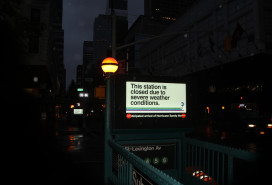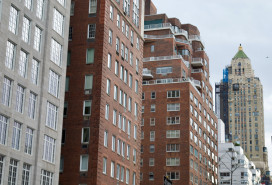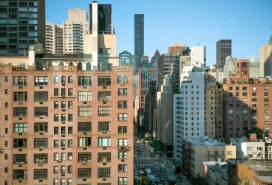Ask Sam: My rental building is being converted to condos and the renovation is making my life miserable. What are my rights?

In New York State, tenants have a right to habitable apartments and common areas, even if your landlord tries to convince you that a certain amount of disruption is standard with a renovation.
My landlord is converting our rental building into condos, and the construction work is causing major quality of life issues for me and my neighbors who remain in the building. The hot water goes on and off all the time, there’s dust in the air, constant noise, and the elevators are often out of service. What are our rights as renters?
It may be cold comfort, but at least you're not alone, says Sam Himmelstein, a lawyer with the firm Himmelstein, McConnell, Gribben, Donoghue & Joseph who represents residential and commercial tenants and tenant associations.
The problem is worse than ever, he says. Conversion projects typically involve combining units and that means serious renovation work. "The conditions become horrible for the people still living there," he says.
While living through a hellish renovation may be commonplace, it's not necessarily legal.
In New York State, tenants have a right to habitable apartments and common areas, even if your landlord tries to convince you that a certain amount of disruption is standard with a renovation. Tenants are protected by something called the warranty of habitability, and this indicates your obligation to pay rent depends on your apartment remaining safe and livable. The only exception to your landlord's responsibility to provide a habitable abode is if the conditions are caused by a labor stoppage, i.e. the city's garbage men go on strike, Himmelstein says.
Protections for tenants in this situation have improved in recent years: New York State's Division of Housing and Community Renewal has a tenant protection unit, for instance, with its own lawyers who will investigate issues like this and inform tenants of their legal rights. And the office of the tenant advocate, part of the NYC Department of Buildings, serves as a resource for tenants living in buildings with disruptive construction conditions. You can contact them directly at tenantadvocate@buildings.nyc.gov, or call 212-393-2949.
The attorney general’s office will also sometimes intervene on behalf of tenants’ rights issues.
“There are lots of governmental options now, and we’ve had some cases involving construction or structurally unsafe buildings where they’ve gotten involved and come down hard on the landlord,” Himmelstein says.
A good start to getting your landlord to comply with the law is to band together with your building's other renters to organize a tenants association—an informal group that can collectively take concerns to the landlord, and if need be, share the cost of hiring a lawyer.
"An individual isn't going to get the landlord to change their building policy, but 40 people well might," Himmelstein says.
Your tenant association should send the landlord a formal letter detailing the problems in the building, both to make the landlord aware of the problem, and create a legal record showing that you gave the landlord notice about the conditions. Request that the landlord address the issues at hand, and let them know that if they don't, you'll move forward with litigation.
Withholding rent either as an individual or as a collective group used to be a common method of getting the landlord's attention, but with renters nervous about landing on the tenant blacklist, says Himmelstein, the practice has petered out.
In addition to writing a letter, call 311 and involve both the Department of Buildings and the Department of Housing Preservation & Development.
“The tenants should go online and see if there is a tenant protection plan on file that the landlord is violating,” Himmelstein says. “They can also look at the permits and applications the landlord filed to do the construction, and see if the landlord is violating the terms of those.”
The DOB will come investigate, and if your landlord’s violations are serious, they’ll place a stop work order on the building. This can be extremely effective at motivating the landlord to address problems, as they’ll want to resume work as soon as possible.
In most cases, it's unlikely that your case will go to court, and instead will end in a settlement that entitles the building's renters to abatements (how much will depend on the nature of the work being done), as well as rules that will make life easier while construction is completed. Landlords frequently agree to designate an on-site representative for residents to contact when there's a problem, give proper notice if any services will be temporarily shut down, clean up daily, and hire an environmental firm to make sure that dust isn't dangerous. You may not be able to make the men in hard hats disappear, but at least you (and your neighbors) will be able to breathe easier.
Another weapon in your arsenal, if conditions in the building are really awful, is filing an HP action seeking a court order for the landlord to make repairs or face heavy fines if they fail to do so. You can file the HP action as a group or by yourself, without hiring a lawyer. While an HP action will almost always result in repairs, it's unlikely to result in financial compensation, like rent abatements, unless achieved as part of an overall settlement, Himmelstein says.
Related:
Ask Sam: My rental wasn't ready when I moved in. Is that constructive eviction? (sponsored)
Ask Sam: Repairs are forcing me to move out for a month. Should my landlord pay me to relocate? (sponsored)
Ask Sam: My apartment is riddled with problems. Can I get my landlord to move me to a new one? (sponsored)
Ask Sam: What kind of problems qualify me for a rent abatement? (sponsored)
Read all the Ask a Renters' Rights Lawyer columns here.
Sam Himmelstein, Esq. represents NYC tenants and tenant associations in disputes over evictions, rent increases, rental conversions, rent stabilization law, lease buyouts, and many other issues. He is a partner at Himmelstein, McConnell, Gribben, Donoghue & Joseph in Manhattan. To submit a question for this column, click here. To ask about a legal consultation, email Sam or call (212) 349-3000.



























